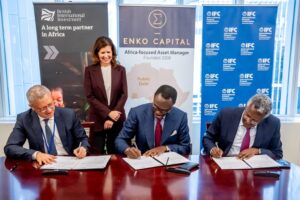Key Developments
Senegal and Global Green Growth Institute Partner to Enhance Urban Mobility

Senegal’s transportation authority, the Executive Council for Sustainable Urban Transport (Cetud), and the Global Green Growth Institute (GGGI) have joined forces to optimize urban mobility in Dakar and other Senegalese cities.
This collaboration follows Cetud’s successful launch of Dakar’s Bus Rapid Transit (BRT) system in January 2024, the first of its kind in sub-Saharan Africa.
The electric bus network currently serves an impressive 300,000 passengers daily.
While the BRT system represents a significant step towards sustainable transportation, both parties recognize the need for a more comprehensive approach.
Traffic congestion, pollution, and ensuring accessibility for vulnerable populations remain pressing challenges in Dakar and other Senegalese metropolises.
The MoU focuses on strengthening governance and building the capacity of public transport personnel.
“Decarbonizing transportation requires overcoming significant hurdles,” said Thierno Birahim, Director General of Cetud. “This partnership is crucial as it will invigorate planning frameworks and address the critical issue of financing green mobility solutions.”
Several ongoing projects align with the MoU’s goals, including the implementation of the Sustainable Urban Mobility Plan (PMUD).
This plan prioritizes a multimodal approach, favoring public and active transportation options.
Cetud anticipates a 60% improvement in public transport network reliability upon the plan’s completion.
Furthermore, the second phase of the Dakar Regional Express Train (TER) project is underway, aiming to extend the rail network to Blaise Diagne International Airport.
This 19-kilometer expansion is expected to ease traffic congestion and reduce annual CO2 emissions by an estimated 92,000 tons.
The West African Development Bank (BOAD) is financing this 35 billion CFA franc (approximately 53.4 million euros) project.
Related Articles
Register Now
Empower Africa Times Newsletter
Share :
You may also like...

SA’s The Awareness Company Secures $1.6M Seed Funding to Enhance AI and Expand Market Reach
South African SaaS startup The Awareness Company has successfully raised $1.6 million in seed funding to scale its marketing and sales efforts while advancing the AI capabilities of its flagship product.

Founders Factory Africa Rebrands as 54 Collective, Plans to Invest in 105 Early-Stage African Startups
South African startup accelerator, Founders Factory Africa, has undergone a significant transformation, rebranding as 54 Collective.

BII Backs Enko Capital’s $100 Million Private Credit Fund to Invest in Mid-Sized Businesses in Africa
British International Investment (BII), the UK’s development finance institution, has made a major anchor commitment to Enko Capital’s new private credit vehicle — the Enko Impact Credit Fund (EICF).
